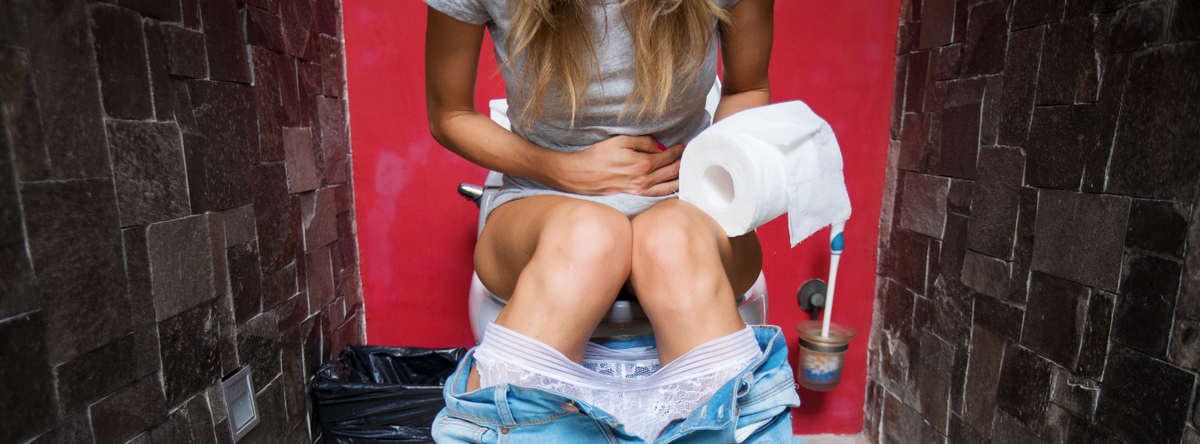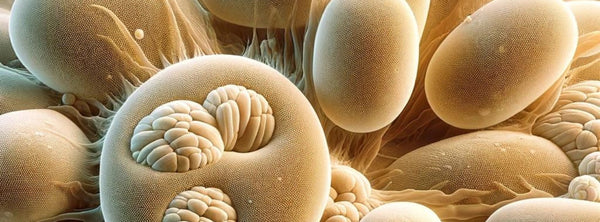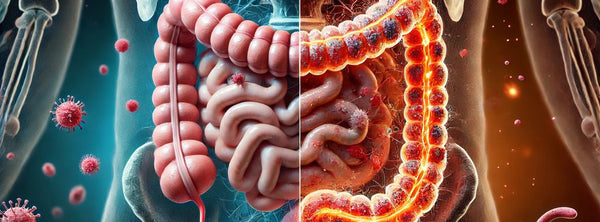
What Is Diarrhoea?
Diarrhoea is defined as watery, loose or mushy stools. People suffering from severe Diarrhoea will a have more watery stool, while sufferers of mild Diarrhoea will have loose, mushy stools.
Diarrhoea can affect people randomly throughout the year, generally in the form of a tummy bug or after food poisoning. For others though, Diarrhoea may be a constant daily companion and if left unchecked, can lead to an array of potential health problems including; fatigue, malnutrition, depression and an embarrassing anxiety-filled desire to map out the location of public toilets 😱.
In an ideal world, a person's daily stool should be more like a ripe firm banana, that is easy to pass with little mess.
Symptoms Of Diarrhoea
Besides loose or watery stools, there are some additional symptoms often associated with Diarrhoea.
- Abdominal bloating
- Urgent bowel motion
- Abdominal pain and cramps
- Nausea or vomiting
- Fever
- Burning when passing a motion
- Chafed anus - from excessive toilet paper use....the least pleasant symptom 😩
Side Effects Of Diarrhoea Or Loose Stools
For most people Diarrhoea is short-lived, but for those with daily loose or watery stools, there can be long-term and far-reaching health complications.
- Dehydration is a common side-effect of Diarrhoea or loose stools. The colon naturally absorbed excess fluid from the stool to improve its texture and to make the stool more substantial. The water reabsorbed by the colon also helps to rehydrate the body. However in the case of Diarrhoea, the fluid that is lost down the toilet results in a person becoming dehydrated, unless the fluids are replaced. Dehydration can be life-threatening, especially in children and the elderly.
- Nutrient Deficiencies are common in people suffering from acute and long-term Diarrhoea and loose stools. Nutrients are absorbed as food passes through the small and large intestines. However If the stool passes through the intestines too quickly, as is the case with Diarrhoea, nutrient absorption is reduced and deficiencies occur. Some common nutritional deficiencies include magnesium, folate, zinc, B-group vitamins, vitamin C and vitamin A. Nutrient deficiencies can lead to all sorts of health complications from fatigue to weight gain, immune suppression, even dementia and cancer.
- Low Levels of Beneficial Gut Bacteria often occur among sufferers of Diarrhoea. With regular bowel transit times, the fibre in our food is consumed by bacteria and converted to short-chained fatty acids. These acids then provide nourishment for the entire range of beneficial bacteria and the microbiome ( the healthy bacteria that help to promote digestive, immune, cardiovascular, cognitive, and neurotransmitter health). Also, healthy beneficial bacteria produce many essential vitamins including; K2, folate, B1, B2, B3, B5, B6, B12 and biotin. Lower than normal levels of good gut bacteria can lead to; digestive issues, cognitive decline, immune suppression, autoimmune diseases and even some types of cancer.
- Poor Mental Health and Cognitive Function. The intestinal tract is home for many of the body's significant neurotransmitters and receptors including; Serotonin, Acetylcholine, GABA and Dopamine. Diarrhoea can lead to nutritional deficiencies, intestinal inflammation, leaky gut syndrome and Dysbiosis, all of which play substantial roles in creating neurotransmitter imbalances. These imbalances are often a leading cause of mental health and cognitive problems such as; depression, anxiety, brain fog, poor memory and low concentration.
What Causes Diarrhoea And Loose Stools?
Unfortunately there are many causes of Diarrhoea. What may set one person off, may not necessarily cause Diarrhoea in another. To help create a better understanding of the potential triggers, here is a list of the more common causes of Diarrhoea.
Dysbiosis or Intestinal Infection can cause Diarrhoea by impacting the levels of beneficial gut bacteria, which maintain digestive health and a well-formed stool. Harmful gut organisms, including clostridium difficile, blastocystis hominis, citrobacter, candida albicans and dientamoeba fragilis, can destroy beneficial bacteria and reduce their ability to maintain stool formation. Dysbiosis is one of the most common causes of Diarrhoea and loose stools.
Food Allergies or Intolerances can irritate the lining of the intestines and cause the bowel to react violently, while trying to eliminate the offending substance. Food allergies affect everyone differently, whilst a particular food may have health-promoting qualities for one person, for another, it may lead to gripping pain and urgent bowel evacuation. As Hippocrates famously said 'One man's food is another man's poison'.
Medication plays a role in helping a person combat or cope with a specific disease. Unfortunately the side effects of some medicines causes Diarrhoea. Antibiotics, antidepressants, antacids, protein pump inhibitors (heartburn medication) and various chemotherapy drugs can cause Diarrhoea, with Antibiotics being the worst offender.
The role of antibiotics is to destroy harmful bacteria, but unfortunately they can not detect the difference between good or bad bacteria, so they kill them all. Good intestinal bacteria are essential in maintaining digestive health and well-formed stools. Imbalances in good bacteria levels leads to Dysbiosis and intestinal inflammation, with both significantly contributing to Diarrhoea.
Excess Stress and Anxiety can play significant roles in exacerbating Diarrhoea and loose stools. The digestive tract and brain have a strong connection, often called the gut-brain axis. The common link between the two is the unique nervous system called the Enteric Nervous System (ENS). The ENS regulates and communicates the goings-on in the gut to the brain and vice versa. When the mind is stressed, or anxious, chemical messengers are sent to the digestive system, which responds with physical symptoms including Diarrhoea, loose stools, flatulence, abdominal pain, bloating or constipation.
Lactose is the sugar found in milk and dairy products and is broken down by the enzyme lactase. When we are born, our lactase levels are high, as the breast milk is rich in lactose. As we age, our body's ability to produce lactase declines and for some people this causes the lactose to ferment in the intestines, resulting in flatulence, bloating, abdominal pain and loose stools or Diarrhoea.
Gluten is found in a variety of grains, with wheat being the most commonly available source. For some people, gluten causes an immunological reaction which results in a condition known as coeliac disease. When a sufferer ingests even a small amount of gluten, they can soon be found on a toilet, in a lot of pain, passing loose, watery stools. However a person doesn't need to be a coeliac to experience Diarrhoea after eating gluten. Gluten is a hard molecule to breakdown, especially if the digestive system is weak. As gluten passes through the intestines, it can irritate the lining and cause a speedy removal by the intestines, with an explosion of loose, watery stools.
Coffee, now this may surprise some people, but when the body consumes caffeine, the liver and the detoxification enzymes register it as a poison that needs to be eliminated. It does this by combining the caffeine with excessive amounts of bile, which has a significant laxative effect on the intestines—resulting in a quick evacuation of an unformed stool.
Alcohol speeds up peristalsis; the rate in which the colon squeezes the faeces through the intestines. When this process is sped up, the colon is unable to reabsorb the water from the stool effectively, resulting in Diarrhoea and dehydration.
Underlying Health Conditions can be a source of Diarrhoea and will need to be treated before the Diarrhoea can be resolved. Irritable Bowel Syndrome, a condition in which the stools alternate between Diarrhoea and constipation is often caused by Dysbiosis, poor dietary choices and excessive stress. Other digestive disorders, including Crohn's disease and ulcerative colitis, produce Diarrhoea because the immune system attacks the intestines, resulting in irritation, inflammation and a reduced ability to absorb fluids.
How To Treat Diarrhoea Or Loose Stools?
When patients present with Diarrhoea or loose stools, we firstly treat them for an intestinal infection or Dysbiosis, while increasing the numbers and health of their beneficial bacteria. This process improves digestion and the consistency of the stool. The Beneficial Bacteria Health Pack provides all the necessary supplements needed to treat Dysbiosis and improve the levels of the good gut bacteria. Dysbiosis is one of the most common causes of Diarrhoea and loose stools.
If Food allergies or sensitivities are suspected, an easy do at home Food Allergies Test is suggested. This will help to identify the offending Diarrhoea forming foods.
Antibiotics can cause changes in bowel motions. It is important that while on medication to take unique probiotics to help reduce the incidence of loose bowels and Diarrhoea. The yeast probiotic strain, Saccharomyces boulardii, is not affected by antibiotics and helps to protect the beneficial bacteria and destroy any harmful organisms, while preventing antibiotic-induced Diarrhoea. Taking a multi-strain probiotic at least 4 hours away from antibiotics will also be advantageous in helping to maintain levels of healthy gut bacteria.
If stress and or anxiety are constant companions, taking steps to alleviate their hold is essential in helping to reduce Diarrhoea. Simple techniques such as exercise, meditation, tai chi, yoga and deep breathing all play significant roles in helping to calm the body, increase levels of GABA and serotonin, plus reduce the severity of stress and anxiety. Nutritionally, in the clinic, we give patients suffering from stress and anxiety the Stress Support Pack.
Listen to your own body. You may find that after eating or drinking dairy, gluten, coffee or alcohol that your bowel motions become loose or watery. If so, it might be time to say goodbye to those offending substances. You'll be surprised how many other niggling health issues such as; fatigue, rashes, itchy skin, or abdominal pain may also clear up.
We hope you found this blog '9 Common Causes of Diarrhoea or Loose Bowels' useful and if you did please leave a comment below or share on social media. We'd love to hear from you.
If you need help treating Diarrhoea, loose bowels or any other digestive ailment, we're here for you. Simply purchase an initial 60-minute consultation and we'll contact you for a suitable time. It's that easy.
Thanks and have a great day!
The information provided in this blog '9 Common Causes of Diarrhoea or Loose Bowels' is general and intended for educational purposes only. We make no claims to diagnose, treat, prevent, alleviate or cure illnesses or diseases with any information or product stated. With any health issue, we suggest you consult your healthcare professional before undertaking any health treatment.
References:
- Nemeth V, Pfleghaar N. Diarrhea. [Updated 2020 Jul 19]. In: StatPearls [Internet]. Treasure Island (FL): StatPearls Publishing; 2021 Jan-.
- Scrimgeour D. Chronic intermittent diarrhoea and fatigue. Aust Fam Physician. 2001 Sep;30(9):897. PMID: 11676320.
- Lee C, Doo E, Choi JM, et al. The Increased Level of Depression and Anxiety in Irritable Bowel Syndrome Patients Compared with Healthy Controls: Systematic Review and Meta-analysis. J Neurogastroenterol Motil. 2017;23(3):349-362. doi:10.5056/jnm16220
- Arasaradnam RP, Brown S, Forbes A, et al. Guidelines for the investigation of chronic diarrhoea in adults: British Society of Gastroenterology, 3rd edition. Gut. 2018;67(8):1380-1399. doi:10.1136/gutjnl-2017-315909
- Levine AC, Glavis-Bloom J, Modi P, et al. Empirically Derived Dehydration Scoring and Decision Tree Models for Children With Diarrhea: Assessment and Internal Validation in a Prospective Cohort Study in Dhaka, Bangladesh. Glob Health Sci Pract. 2015;3(3):405-418. Published 2015 Aug 18. doi:10.9745/GHSP-D-15-00097
- National Research Council (US) Subcommittee on Nutrition and Diarrheal Diseases Control. Nutritional Management of Acute Diarrhea in Infants and Children. Washington (DC): National Academies Press (US); 1985. 1, NUTRITIONAL CONSEQUENCES OF ACUTE DIARRHEA.
- Zhuang X, Tian Z, Li L, Zeng Z, Chen M, Xiong L. Fecal Microbiota Alterations Associated With Diarrhea-Predominant Irritable Bowel Syndrome. Front Microbiol. 2018;9:1600. Published 2018 Jul 25. doi:10.3389/fmicb.2018.01600
- Mittal R, Debs LH, Patel AP, et al. Neurotransmitters: The Critical Modulators Regulating Gut-Brain Axis. J Cell Physiol. 2017;232(9):2359-2372. doi:10.1002/jcp.25518
- Wang Z, Xu CM, Liu YX, et al. Characteristic dysbiosis of gut microbiota of Chinese patients with diarrhea-predominant irritable bowel syndrome by an insight into the pan-microbiome. Chin Med J (Engl). 2019;132(8):889-904. doi:10.1097/CM9.0000000000000192
- Katsumata R, Ishii M, Lee S, et al. Cytokine Profile and Immunoglobulin E-mediated Serological Food Hypersensitivity in Patients With Irritable Bowel Syndrome With Diarrhea. J Neurogastroenterol Motil. 2018;24(3):415-421. doi:10.5056/jnm17114
- Barbut F, Meynard JL. Managing antibiotic associated diarrhoea. BMJ. 2002;324(7350):1345-1346. doi:10.1136/bmj.324.7350.1345
- Chan Y, So SH, Mak ADP, Siah KTH, Chan W, Wu JCY. The temporal relationship of daily life stress, emotions, and bowel symptoms in irritable bowel syndrome-Diarrhea subtype: A smartphone-based experience sampling study. Neurogastroenterol Motil. 2019 Mar;31(3):e13514. doi: 10.1111/nmo.13514. Epub 2018 Nov 18. PMID: 30450780.
- Deng Y, Misselwitz B, Dai N, Fox M. Lactose Intolerance in Adults: Biological Mechanism and Dietary Management. Nutrients. 2015;7(9):8020-8035. Published 2015 Sep 18. doi:10.3390/nu7095380
- Fine KD, Meyer RL, Lee EL. The prevalence and causes of chronic diarrhea in patients with celiac sprue treated with a gluten-free diet. Gastroenterology. 1997 Jun;112(6):1830-8. doi: 10.1053/gast.1997.v112.pm9178673. Erratum in: Gastroenterology 1998 Feb;114(2):424-5. PMID: 9178673.
- Willson C. The clinical toxicology of caffeine: A review and case study. Toxicol Rep. 2018;5:1140-1152. Published 2018 Nov 3. doi:10.1016/j.toxrep.2018.11.002
- Chiba T, Phillips SF. Alcohol-related diarrhea. Addict Biol. 2000 Apr 1;5(2):117-25. doi: 10.1080/13556210050003702. PMID: 20575826.



